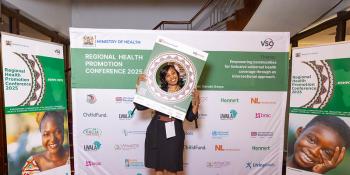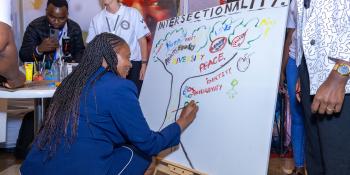Giovanni Villafuerte considers himself a ‘jack of all trades, master of none’. However as a two-time VSO volunteer, community leader and a producer, he certainly has mastered enough skills to make him a valuable member of VSO Cambodia. Giovanni is currently working to support farmers to turn their enterprises into robust businesses. Here he talks about the experience as a whole, and the impact he sees.
By Giovanni Villafuerte
There is a beauty in volunteering.
When you work in a country as a volunteer, you are often respected more than a well-paid consultant because you are part of the community.
I have gone beyond my limits and tested my breaking point in this placement. Volunteering has increased my ‘face value’. I know that this experience has given me new skills like being able to think outside the box. I will never have a hard time finding a job now.
I’m currently volunteering in Cambodia as a business adviser. Cambodia is a big producer of rice per capita. My placement is about assisting small farmers, helping them to strengthen their bargaining power, their decision-making and business skills. We’re teaching them about planning, looking at what crops have low production cost, low risk but still give a profit.
It’s part of a programme called Improving Market Access for the Poor. We are working across the value chain, from the rice farmer, to brokers and millers and exporters. We are identifying the bottlenecks and seeing where we can correct them."
Better business decisions
Farmers here just think of farming as a traditional thing that their parents and grandparents have done. We’re injecting business concepts, like calculating input costs, labour costs, pesticides and so on. It will help them make better decisions.
We started with a livelihood analysis, looking at the risks and then tailoring interventions. Then it’s about implementation.
Drought has been terrible here in Cambodia. The weather pattern has changed dramatically. It hasn’t rained for five months when usually this time of year [April] they would begin planting the paddy. They can’t do that now without the rain and it’s taking a toll on their livelihood.
Farmers can’t invest in vegetables because that also needs water. Their cows need better grass. So we are exploring drought-resistant crops and other business options that can be done during drought.
There have been challenges working with the farmers here. Having lived through the Khmer Rouge for a long time, people are used to a ‘top down’ or ‘command and control’ way of things. They haven’t been used to thinking for themselves. However I cannot tell them what to do; I can only guide them.
Working together
Another issue has been with trust amongst farmers. Even though selling collectively through a co-operative will give them more bargaining power, there’s still a lot of debate between the members.
We have made impact however. For example, we unmasked the perception that financial institutions or banks are unapproachable because they are ‘just farmers’. We invited the micro financial institutions to a meeting with the co-operative so that they could present their options. It opened a dialogue so that they could discuss what business they can do together. Now one bank has approached us.
Find out more about becoming a volunteer
Latest posts

The two volunteers empowering girls and young women in Mozambique
Nelma and Carmirene and are two volunteers working on VSO's EAGLE project in Mozambique. For Nelma and Carmirene, education is not just about school, it is about meeting people where they are and using the right tools to challenging harmful norms. Here are their stories.

In photos: Our Regional Health Promotion Conference 2025
Check out some of our favourite photos from Regional Health Promotion Conference (RHPC25). This event sought to reimagine Universal Health Coverage through the lens of intersectionality.

Using intersectionality to create healthy beginnings and hopeful futures
World Health Day brings global attention to the urgent need to end preventable maternal and newborn deaths. Learn more about how our Regional Health Promotion Conference is tackling these issues head on.
